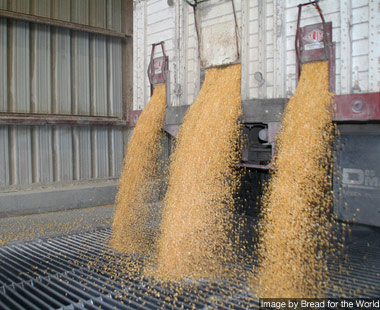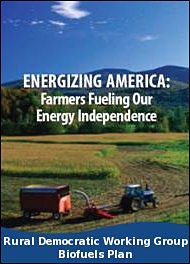Climate Food and Agriculture
All Stories
-
Make your leftover Xmas sweets into something yummy

In my experience, even a calm and pleasant holiday results in a house strewn with bits of paper, empty boxes filled with styrofoam peanuts, a guilt-inducing list of thank-you notes to be written, and a fridge full of leftovers. Here are three recipes for "recycled" holiday desserts that turn less-than-enjoyable ingredients into actual treats:
-
Livestock’s long shadow
The NYT has an editorial today about the UNFAO's new report on the environmental degradation caused by increasing numbers of livestock. Money factoid: More greenhouse gases are produced by livestock than the entire global transportation sector.
-
Umbra on eco-choices
Dear Umbra, While I usually love your column, I have to take issue with encouraging people to eat sushi. This is the second “green” site I have seen that proposes the solution to overfishing is to eat different fish. Saying “of course you can continue to eat at sushi restaurants without feeling guilty” amounts to […]
-
Chinese food quality a concern as 2008 Olympics approaches
In 2000, when Beijing made its bid for the 2008 Olympics, it promised to get all cleaned up if it could please, pretty please, be the host. Its wishes came true, but China's goal of throwing a green Olympics seems ever out of reach. To quote ourselves:
China has promised to throw a "green" Olympics in Beijing in 2008 -- but simple livability may be the megacity's bigger challenge. Beijing has 15.2 million inhabitants; if current trends hold, that number could grow to 21 million by 2020. Gridlock is endemic, as the number of cars more than doubled in the past six years. Already-bad air quality is deteriorating. The city's water supply is so overtaxed that some experts are calling for rationing. City officials are racing to replace thousands of old, stinky public toilets, while over a hundred construction projects related to the upcoming Olympics are hurtling forward. Critics blame decades of bad urban-planning policy for the city's problems. "In the past, we never thought of the capacity of resources," said Huang Yan, Beijing's deputy director of planning. "We only focused on development." She's introduced a master plan that includes the bold goal of rendering Beijing "a city suitable for living."
-
Don’t Have a Cow
About 20 percent of farm-animal breeds* are endangered, says FAO Word association time: What comes to mind when you think “endangered animals”? Odd-looking tropical frogs and obscure birds with funny names? Time to adjust your thinking: The U.N. Food and Agriculture Organization estimates that one in five breeds of farm animal are in danger of […]
-
It’s time for a real ‘food vs. fuel’ debate
Can U.S. farmers keep filling the nation’s bellies as they scramble to fuel its cars? Given its evident gravity, the question has drawn remarkably little debate. Like it or not, though, more and more food is being devoted to fueling the nation’s 211-million-strong auto fleet. High gasoline prices, a dizzying variety of government supports, and […]
-
A Krafty concoction of hydrogenated goo gets its day in court.
Do I live in an ethanol bubble? Yes I do, for another day or so.
But I'm coming up for air for long enough to give the finger to Kraft, the world's largest branded food conglomerate, for ripping off and desecrating one of the world's greatest food items.
Kraft's heinous Guacamole Dip contains about 2 percent avocado, which is a little like marketing a Martini with 2 percent gin and the rest, well, corn liquor (ethanol).
A woman in California is suing Kraft, arguing that the "guacamole" claim fraudulently promised an avocado-based concoction, and instead delivered, well, industrial goo designed to look avocado-y.
Does she have a case?
-
An interview with David Pimentel
Any worthy idea can withstand and even be improved by naysayers; scolds and skeptics play the useful role of pointing out obvious flaws. The biofuels industry has no more persistent, articulate, and scathing critic than David Pimentel, professor emeritus of entomology at Cornell University. David Pimentel. Photo: Chris Hallman / Cornell University Photography. In 1979, […]
-
A look at the impacts of biofuels production, in the U.S. and the world
Nothing but blue skies from now on? Photo: house.gov Great news! We can finally scratch “driving less” off our list of ways to curb global warming and reduce our dependence on foreign oil! Biofuels will soon not only replace much of our petroleum, but improve soil fertility and save the American farmer as well! Sound […]
-
Group lobbies Starbucks to cut the rBGH
 Tired of being cowed into drinking milk laced with artificial growth hormones simply because you can't kick the latte habit? Find it udderly disgusting that the largest food and beverage retailers in the world proliferate antibiotics? Wish Grist would stop milking the cow-related puns?
Tired of being cowed into drinking milk laced with artificial growth hormones simply because you can't kick the latte habit? Find it udderly disgusting that the largest food and beverage retailers in the world proliferate antibiotics? Wish Grist would stop milking the cow-related puns?Well, today you can join in with Food and Water Watch's Hold the Hormones campaign by calling Starbucks and asking them to stop buying milk from dairies that use artificial growth hormones. The D.C.-based nonprofit offers up 10 good reasons to get involved.

